For her personal and symbolic life, her influence on St. Augustine, St. Monica deserves a place of honor in the Christian saints’ calendar.
Her determination, fortitude, intelligence, maternal love and fidelity to the Church were decisive in the religious conversion of her son, one of the greatest figures of the Church and of Western culture.
This attitude makes her an eternal model for Christian wives and mothers.
The Church, in honoring her memory, acknowledges in some way the immense debt she owes to so many anonymous women, who have not only kept the faith of their children, but have guided them in the service of the Church and society.
At the service of husband and children
 Everything we know about Monica we owe to Agustín.
Everything we know about Monica we owe to Agustín.
In his «Confessions» he paid her an eternal homage full of tenderness, admiration and gratitude.
With the same veneration he remembers her in the «Soliloquies», in some letters and even in writings of his old age.
In one of them he attributes his salvation to the prayers of his mother: «the ardent supplications and daily prayers of my good mother […] prevented my perdition»(The Gift of Perseverance, 20:53).
Monica was born in 331 in Tagaste, now Souk-Ahras in Algeria, into a well-to-do family with Christian roots and loyal to the Church during the Donatist schism.
This is what Augustine indicates when he writes that he grew up «in a believing house, a healthy member of your Church»(Conf.
9,8,17).
One of the servants of the house, who had carried her father in her arms, left a strong imprint on her upbringing, accustoming her to discipline her desires.
Outside of meals she did not even allow her to drink water.
«Now you drink water, because you have no wine within reach; but once you are married and own cellars and pantries, you will be disgusted with water, but the habit of drinking will prevail»(Ibid).
Reality soon confirmed the maid’s fears.
Being in charge of preparing the wine for the meal, Monica had the opportunity to go down to the cellar daily and, along with the occasion, came the temptation and the fall.
At first she was content to wet her lips with the wine, since its taste was not pleasant to her, but with time her taste grew, and with it the quantity, and she drank almost a whole glass.
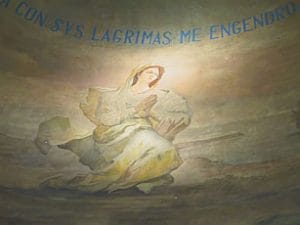 She was saved from danger by the reproach of another maid, who for some time had been a silent spectator of her mistress’s antics.
She was saved from danger by the reproach of another maid, who for some time had been a silent spectator of her mistress’s antics.
In the heat of an argument she threw it in her face, calling her a drunkard.
The insult was engraved in Monica’s heart and, in a reaction characteristic of her personality, she recognized her fault and broke completely with the habit: «wounded by such an insult, she understood the ugliness of her sin and at once condemned it and expelled it from herself»(Conf. 9,8,18).
It was the first sign of a determined character, incapable of hiding behind excuses and ready to face any difficulty; and perhaps also a first sign of self-love and an innate sense of dignity.
The welfare of the family would depend in large part on it.
At the age of twenty she married Patricio, a municipal employee.
Her intervention in the preparation of the marriage was minimal, since at that time the choice of the husband, the handling of the agreements and the wedding preparations were the responsibility of the «paterfamilias».
In her new home she would enjoy greater freedom.
Roman society had made some progress in recognizing the dignity of women and left the administration of the household in their hands.
She would take care of the shopping, the servants, the education of the children, etc.
The welfare of the family would depend to a great extent on her.
The task was not easy.
She had to live with a pagan and fickle husband, capable of the most tender expressions of love, as well as explosions of anger and marital infidelity.
He was, in the words of her son, «extremely affectionate and, at the same time, extremely choleric.»
But he never struck her, which surprised those who knew the violence of his character.
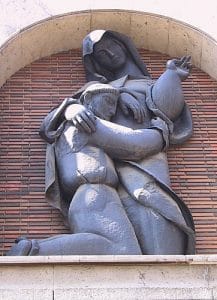 Monica, aware of her situation, set out to make the most of it.
Monica, aware of her situation, set out to make the most of it.
She never argued with her husband, and only when calm returned did she give him a reason for his actions, making him see that «perhaps he had been more exalted than was fair».
She did not even think it necessary to reproach him for his infidelities, she tolerated them with patience and continued to offer him her love in the hope of one day winning him for herself and for the Lord: «telling him about you with her customs, with which you made her beautiful and lovable and admirable in his eyes».
He was aware that custom and environment would render his protests useless and, at the same time, «he hoped that the mercy of Christ would come upon him» and, with faith, would also give him chastity(Conf. 9:9,19).
Example and prayer were his only weapons, and he used them day after day.
Many women today might consider her actions as submissive and contrary to their dignity.
Her sacrifice would have perpetuated an intolerable abuse.
But these opinions forget that behavior like Monica’s requires self-control and firmness of character, and usually bears fruit.
She succeeded in converting her husband, «not having to regret in him being faithful what she had tolerated being unfaithful»(Conf. 9,9,20).
Patrick was baptized a couple of years before his death, which occurred in 371.
The new home was not a pleasant place either.
First of all, it was a pagan household, with customs very different from her own.
She also had to contend with a suspicious mother-in-law and gossipy maids, ready to feed her mother-in-law’s misgivings with their stories.
«At first,» Augustine writes, «her mother-in-law was irritated against her by the gossip of the bad maidservants.»
But soon those tales crashed against her patience and meekness.
The mother-in-law came to her senses and, after just punishment of the culprits, «the two lived in sweet and friendly harmony.»
She showed the same greatness of spirit in her relationships with her friends and acquaintances, for whom she became a pall of tears.
Her domestic success gave her an ascendancy that facilitated her apostolate outside the family sphere.
She never allowed herself to make comments that discredited others, much less her husband, and she instilled the same behavior in her friends.
«She found a way to bring her pacifying gifts into play among all kinds of people at enmity. […] He never told anything to one of them about the other, except what could be useful for their reconciliation» (Conf. 9,9,21). (Conf. 9,9,21).
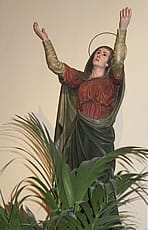 She exhorted them to be tolerant with their husbands and not to air the faults of those who were absent.
She exhorted them to be tolerant with their husbands and not to air the faults of those who were absent.
She abhorred gossip and when her friends fell into her nets, she isolated herself, neither participating in rumors nor divulging other people’s faults.
Far from joining in each other’s tales, she strove to smooth tensions and reconcile opposing moods.
«She found ways to bring her peacemaking skills into play among all kinds of enemies. […] She never told anything to one about the other, except what could be useful for their reconciliation»(Conf. 9,9,21).
Monica had three children: Agustin, who was possibly the eldest, Navigio and a sister of unknown name.
The last two gave her no major problems.
Navigio, a young man of delicate health, introverted and curious, probably married, as did his sister.
The latter was soon widowed and later became abbess of the monastery of Hippo.
Some of Augustine’s nieces also entered the monastery, but it is not known if they were daughters of Navigius or of his sister.
The same happens with Patricius, cleric of the church of Hippo, and with his brother, subdeacon of that of Milevi.
It was Agustín who occupied Monica’s attention.
His talent required special care and she never denied him it.
She suffered with him, accompanied him in his doubts, warned him against the danger of lust – «very concerned she advised me privately not to fornicate and, above all, not to commit adultery»(Conf.2,3,7) – and reproached him for his doctrinal errors and moral deviations, even going so far as to throw him out of the house.
At other times she adopted gentler methods, taking advantage of the riches of her maternal heart.
She sought the advice of wise people whom she considered capable of dispelling her son’s doubts and guiding him on the right path, and, above all, she remembered him day and night before the altar of the Lord.
The struggle lasted three lustrums and in it Monica showed unsurpassed maternal love, constancy, sagacity and a spirit of faith.
The result of her efforts was a masterpiece.
The result of his efforts was a masterpiece.
When he was a newborn, she took him to church, enrolled him in the register of catechumens and instilled in him a love for Jesus Christ.
One day Augustine would confess that no book, «however elegant and erudite it might be,» filled him completely if he did not find in it the name of Jesus Christ, whose sweetness he had suckled «with my mother’s milk»(Conf.
3,4,8).
However, in accordance with the practice of her time, Monica did not feel the need to baptize her son.
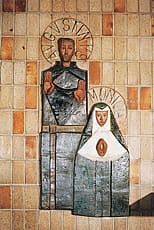 In perfect agreement with her husband, she went out of her way to give him a quality education, and did not interrupt it either when the death of her husband weakened the family budget or when the awakening of passions and maternal love led her to subordinate the spiritual welfare of her son to her professional career.
In perfect agreement with her husband, she went out of her way to give him a quality education, and did not interrupt it either when the death of her husband weakened the family budget or when the awakening of passions and maternal love led her to subordinate the spiritual welfare of her son to her professional career.
She feared that marriage would ruin her studies and, consequently, compromise her professional future as well.
Some biographers have seen in this behavior of the saint a proof of her perspicacity.
Augustine was not of the same opinion.
In spite of the affection with which he surrounds his mother, in the «Confessions.» She criticizes it and attributes it to the weakness of her faith: «Not even my carnal mother, who had already begun to move away from Babylon, but was otherwise slow to do so, took care […] to contain with the bonds of marriage that which she had heard from her husband about me […]. She feared that the marriage bond would frustrate the hope she had for me. Not the hope of future life, which my mother had placed in you, but the hope of letters, which both father and mother ardently desired».
She thought that studies, far from being an obstacle, would be «of no little help in reaching you»(Conf. 2,4,8).
His faith had to be nourished by tribulation.
And she did not lack it.
From 371 to 386 Monica lived a real ordeal.
One day Augustine went to live with a woman, another left the Church and joined the Manichaeans, a sect that fought against her, and another fell into skepticism.
She suffers and cries, but does not give up.
A dream in which she sees her son in the same rule in which she finds herself comforts her and assures her of victory.
One day her son will share her faith.
In 374 he reaches him in Carthage and for nine years he lives with him, until 383, when he suffers one of the great disappointments of his life.
Augustine, dissatisfied with the students of Carthage, decides to try his luck in Rome and, to do so without restrictions, abandons his mother on the beach and embarks covertly to Rome.
Monica feels the blow.
She calls him a liar and a bad son.
But she keeps praying for him and at the first opportunity she crosses the sea and catches up with him in Milan.
Augustine was still in doubt, without any certainty and desperately searching for something to believe in: «He had reached the depths of the sea and despaired of finding the truth»(Conf.6,1,1).
Disappointed with the Manichaeans, he had joined the skeptics, from whom he soon moved on to the Neoplatonists and finally ended up as a listener of St. Ambrose and a reader of St. Paul.
Monica celebrated the change, but without enthusiasm.
Her joy would not be complete until her son’s total conversion.
She then thought that marriage could perhaps serenade him and found him a bride of his own social class.
Augustine yielded to social conveniences, to the pressures of his mother and perhaps also to the designs of Providence, and with immense pain in his heart – «my heart, torn by that part that was attached to it, had been wounded and was pouring blood» – he said goodbye to the woman with whom he had lived for 15 years.
But before his fiancée reached marriageable age, grace came and with it came baptism and the renunciation of marriage, honors, riches and all the hopes of this century.
Monica could sing victory.
Her son had already climbed on the ruler of sleep.
In Casiciaco she takes care of Agustín and his friends «as if she were everyone’s mother».
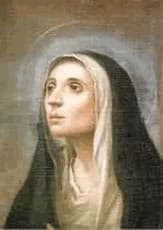 She spent the remaining year of her life at her son’s side, savoring the honey of triumph.
She spent the remaining year of her life at her son’s side, savoring the honey of triumph.
In Casiciaco she takes care of Augustine and his friends «as if she were the mother of all».
She intervenes in his philosophical dialogues, arousing his admiration.
In March 387 she was again in Milan, where Augustine had returned to enroll in the list of catechumens.
Then came the confrontation of Ambrose with the Empress Justina, who demanded the surrender of a church in the city to the Arians.
Monica sided with the bishop and locked herself with him in the church to prevent the attack.
Finally, on Easter night, she joyfully attended the baptism of her son, her grandson Adeodatus and Adeodatus and Alypius, Augustine’s soul-friend.
Within a few weeks they were all in Ostia, waiting for a ship to take them back to Africa.
In their homeland it would be easy for them to find a suitable place to serve God.
One day, while resting from their journey, mother and son experience the so-called ecstasy of Ostia.
Leaning out of the window, together they discuss «what the eternal life of the saints would be like […], coming to touch with the impetus of their heart that region of endless abundance in which you feed Israel eternally with the pasture of truth».
Monica sensed the approach of death.
«My son, nothing delights me any longer in this life […] One thing I desired, and that was to see you a Catholic Christian before I died.
God has more than granted it to me, since, despising earthly happiness, I see you as his servant.
What am I doing here?»(Conf. 9.10,26).
Five days later she fell ill and after a brief illness she died: «nine days after her illness, at 56 years of her age and 33 of mine, that religious and pious soul was freed from her body»(Conf. 9.11,28).
Augustine, fulfilling his last will, buried his mother in Ostia: «bury this body anywhere, do not worry about its care; I only ask you to remember me before the altar of the Lord […] Nothing is far away for God, nor is there any fear that he will ignore where I am at the end of the world to resurrect me»(Conf. 9,11,27-28).
On the path to holiness
Providence endowed Monica with a wholesome nature and placed her in a believing family that directed her towards the good from her earliest childhood.
She was intelligent, sensitive, determined and self-confident.
But as Adam’s daughter, she was also flawed.
She was possessive, with a solemn demeanor and a clear awareness of her dignity.
Other weaknesses of her adolescence and her excessive interest in her son’s professional success have already been mentioned.
Perhaps her grief at her son’s departure was also not completely pure.
At the age of 40, God was not yet the only object of her life.
Tribulation, continuous prayer, daily Eucharist, fasting, almsgiving, filial obedience to the Church and respect and love for priests and monks would day by day clear her of her selfishness and assimilate her more and more to her Divine Master.
The cult
Monica was unconcerned about her body.
But the Christians did not forget her.
Anicio Auquenio Basso had a metrical inscription carved on her tomb (408).
On April 9, 1430 Martin V transferred her remains to the Roman church of St. Augustine and deposited them in a beautiful chapel, where they await the resurrection of the flesh.
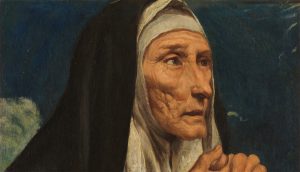 The «Confessions» of Augustine preserved his memory in the Church, but his cult only began to spread after the transfer of his body to Rome.
The «Confessions» of Augustine preserved his memory in the Church, but his cult only began to spread after the transfer of his body to Rome.
Eugene IV (1431-47) instituted in her honor a confraternity of Christian mothers and since then her name has always been linked to them.
In the 16th century Baronius incorporated her into the Roman Martyrology.
A little later, St. Francis de Sales extolled her virtues in his «Introduction to the Devout Life».
In 1551 the Augustinians already celebrated the deposition of the body (May 4) and its transfer (April 9).
The latest liturgical reform has emphasized her connection with her son by moving her memorial to August 27, the eve of the feast of St. Augustine.
In the 19th century, her cult became widespread.
In 1850 an association of Christian mothers arose in the Parisian basilica of Our Lady of Sion, which, after being approved by Pius IX (1856), spread throughout the world.
In 1858 there were already 317 unions in France and 19 outside France.
To the association of Rome, in which our saint shared the patronage with Our Lady of Childbirth, 694 unions were added between 1884 and 1902 in all Italy.
Another 696 were added from 1913 to 1930.
In 1865 Bougaud published a successful biography of the saint, which was immediately translated into several languages.
In 1982, Father Lorenzo Infante (1905-1997) founded in Madrid the «Comunidad Madres Cristianas Santa Monica» with the aim of forming mothers «who, convinced that faith is the greatest treasure they can bequeath to their children, effectively defend their children’s faith».
It already has thousands of members in various countries in Europe, America and Asia.